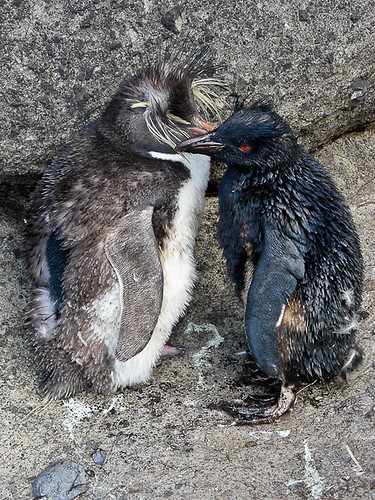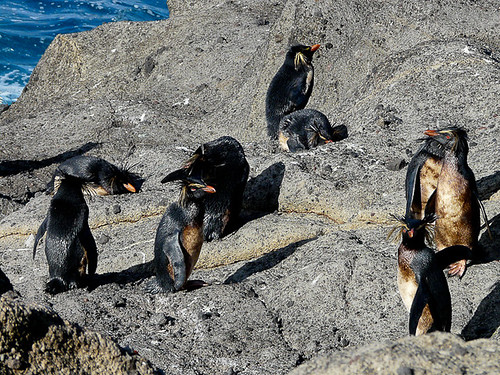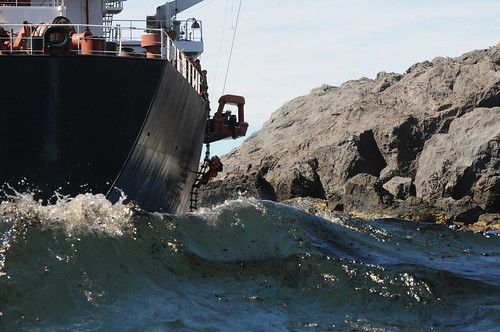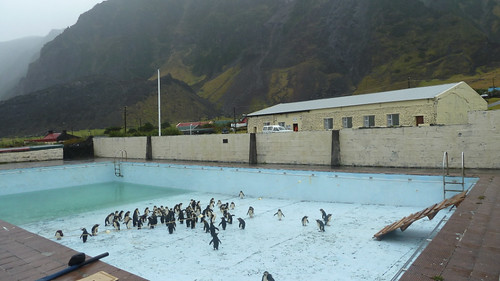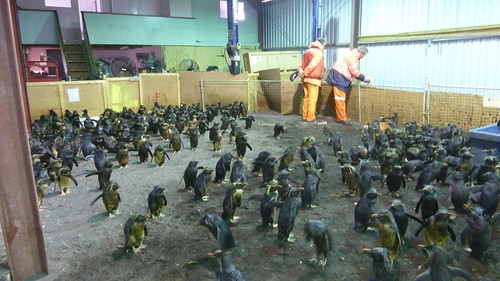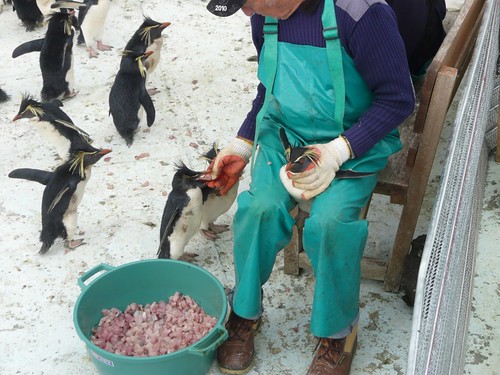A World Away From the Gulf, Penguins Fight Oil Too
As scientists investigate whether the BP oil disaster contributed to an unexplained die-off of dolphins and sea turtles in the Gulf, another oil disaster is underway thousands of miles away in the middle of South Atlantic.
Tens of thousands of critically endangered Rockhopper Penguins are threatened by a disastrous shipwreck on March 16 that dumped about 300,000 gallons of heavy marine oil into their pristine habitat on Nightingale Island, part of a small chain of islands that are home to the second largest concentration of seabirds in the world.
The ship’s oil has completely encircled two critical penguin island habitats, including a World Heritage Site. The penguins have recently been molting and are trying to get back in the water, according to Dr. David Guggenheim, a marine biologist who witnessed the crew's rescue before the ship sank.
“It couldn’t have come at a worst time,” Guggenheim says. “The penguins are hungry and eager to get back in the water. But that’s the worst thing they could do, because they are surrounded by oil.”
Guggenheim was on an environmental expedition on the ship Princess Albert II, which fortunately was near the wreck at the time. The marine biologist says the thick fuel oil poured out of the cargo ship and ruined the zodiac boats that rescued the crew as their ship crashed against the rocks.
Oiled Rockhopper Penguins on Nightingale Island Photos: Trevor Glass
Oiled seas during rescue of the Oliva crew Photo: Kristine Hannon
Now attention has turned to protecting the Rockhopper Penguins and thousands of other threatened birds. Locals from the nearby island of Tristan de Cuna, a tiny British territory halfway between Argentina and South Africa, are collecting thousands of penguins, many of them soaked in oil, and housing them in a drained indoor community pool.
Feeding them has become a major problem since 150 island residents barely have enough food to give them. Guggenheim says the islanders have emptied their freezers of seafood and are trying to catch fish to keep the birds alive until they can be moved to a safer location. He says a small team of rescuers are now trying to capture more penguins on the two oil-encircled islands before they get tarred with thick crude that can be lethal to marine life.
The Malta-flagged cargo vessel, the Oliva, was carrying soybeans and fuel oil traveling from Brazil to Singapore. There still are plenty of questions about how the ship ended up here, Guggenheim says. “How the captain of a ship could crash into one of the most remote archipelagoes of the world far away from shipping lanes is a mystery to me.”
Whatever the reason, the outcome could be catastrophic for endangered penguins and other majestic sea birds such as the Albatross and the Great Shearwater.
Guggenheim, a senior fellow at the Ocean Foundation in Washington DC, has set up a Nightingale Island disaster website to raise money to help rescue the penguins and other sea life threatening this environmental treasure.
There is no airport or landing strip on the islands and the nearest port in Cape Town is a five-day voyage. Guggenheim says they are trying to arrange for a ship to bring a helicopter out to the islands to assist with the rescue.
Penguins being cared for on Tristan de Cuna Photos: Katrine Herrion
One lesson in all of this, Guggenheim says, is that a little bit of petroleum can cause a lot of damage in a marine environment. It’s all about location, location, location.
”It doesn’t take a Deepwater Horizon in the Gulf or a supertanker to cause an environmental catastrophe. It’s all about where and when the oil hits. And they couldn’t have picked a worse time or place than Nightingale Island right now.”
That’s exactly what shimpers say about the BP oil disaster. The well blew up just before the shrimp season started last year, gushing Louisiana crude straight into the heart of one of the world’s richest fishing grounds. It’s way too early to know what the impact will be.
Meanwhile, in the cold gale-force winds of the South Atlantic, a desperate rescue is underway by a small group of determined islanders. With some help and some luck, the colony of Rockhopper Penguins can be saved and moved to a safer location.
But down in the bayou, the shrimp, dolphins, sea turtles and all the rest of the marine life can’t be moved. They will have to survive the BP oil disaster on their own.

